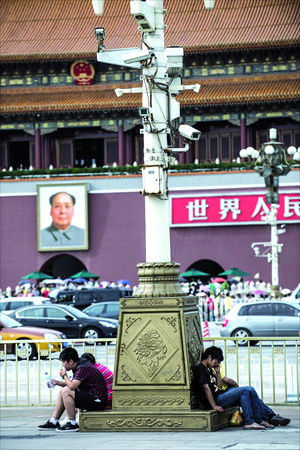Beijing’s guardian angels?


"I feel my academic freedom has been violated," said Liu Xin, Professor of Law from the China University of Political Science and Law (CUPL), referring to recent installations of closed-circuit television (CCTV) camera systems in all the classrooms on campus.
"A classroom should be a space which has enough freedom for academic discussion. Knowing we are teaching in front of cameras makes us reconsider what we say," Liu told Metro Beijing.
CCTV used to only mean China Central Television, the national TV channel in China, yet with the growing numbers of surveillance cameras, more and more people are associating the acronym with another CCTV, the existence of electronic eyes watching them above head. The feeling of being filmed can mean both "being cared for" and "being peered on".
Crime watch
The domestic installation of CCTV is part of China's Skynet project. Jointly launched by the Ministry of Public Security and Ministry of Industry and Information Technology (then the Ministry of Information Industry) in 2005, the Skynet project involves installing CCTV systems in cities to provide graphics and videos for managing the city, to fight crime and prevent possible disasters.
China has been building up its own Skynet, publicly, with governmental funding.
The nature of Skynet demands more cameras on roads, squares, in hotels, malls and schools to provide more detailed information, which has led to an explosion of cameras in Beijing.
Statistics from the police department show the number of CCTV cameras already reached 267,000 in 2007, boosted by 90,000 in 2008. Now this number is more than 800,000, as revealed by Wu Hequan, Secretary General of the Chinese Academy of Engineering, at the 2012 International Fiber Communication Forum.
If 800,000 is the correct number, then Beijing has already surpassed London, which owns 500,000, and has become the world's most watched city.
Some citizens are happy about the current situation. Peng Hongchang, 35, is an investment counselor who owns a Buick and an apartment in a residential compound with CCTV by the road, in the stairway, elevator and parking lot. Peng believes these cameras help to keep his compound safe. "I haven't heard any burglary cases in my compound for some time," said Peng. "Those cameras must work to some extent, at least making thieves think twice before they act."
Moreover, the cameras by roads help to identify accident responsibility, Peng said. "This is always a good thing for those drivers who follow traffic laws and regulations."
Invasion of privacy
At South-Central University for Nationalities in Wuhan, Hubei Province, many classrooms have been installed with not just one camera but three. Many other universities are also installing CCTV systems, since installing CCTV is a policy of the State Education Commission (SEC), a CUPL authority explained to Liu.
"It's not compulsory, but SEC will provide funds for colleges to do it," said Liu. "I was also told that the cameras were installed to prevent possible cheating during the CET 4 and 6 exams [National English Test for college students]."
Yet Liu's more concerned about whether academic discussion would be monitored and recorded. "CET 4 and 6 exams only take place a few times a year. What about all the other times? Teachers will fear whether something they want to say is correct," noted Liu.
Off campus, others are similarly reserved. For Bai Xueqi, a 23-year-old mobile retailer, CCTV cameras pose a somewhat embarrassing threat. "The cameras are usually deployed high above our heads," said Bai. "In summer people wear less and more of their body is exposed. What if these cameras take some images of private parts of the body?"
Indeed, in August of 2011, a photo became a heated topic on Chinese social networks, which was taken by a surveillance camera in Mianyang, Sichuan Province, showing a Nissan driver steering with one hand and touching the chest of a lady with the other.
Though the police finally discovered the picture was illegally downloaded and spread by staff from a computer company, the incidence aroused national concern about people's rights to privacy.
"A car is private property and actions inside a car should be respected as private," said Liu. "This principle is also applicable to all other intimate areas. Unless someone is exposing stuff intentionally, their information should be protected."
Into focus
These cameras are creating a world in which stepping out of the home means stepping into surveillance. They are also provoking important discussions about what exactly defines privacy when out in public areas. As the debate rages, there is no clear-cut consensus about whether the cameras should be taken down or not.
Currently there is no law about protecting privacy in China, let alone a law specifying the use of CCTV. So booming numbers of cameras lead to a serious imbalance between state power over individual power. Liu says that time has come for a legislative body to act on this. "China has lots of room for improving the balance between state power and individual, and a law on privacy protection would significantly change the situation," she said.
But Quan Zongjin, Liu's colleague and deputy professor from CUPL, pointed out it's difficult to identify privacy in a public space. "If we agree that the right to privacy is 'the right to be left alone', then stepping into a public space means you have partly given up your privacy," said Quan. "What cameras should film, what cameras can film and what negative results will occur are three different questions and they should be judged differently."
Both Liu and Quan agreed though that in a public space it would be better to post signs around CCTV cameras to inform people of the existence of surveillance. "At least this will help people to know and behave themselves," said Liu.